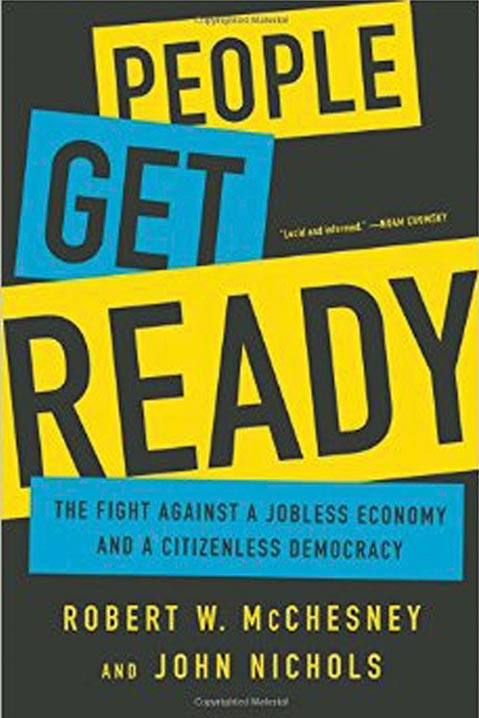‘People Get Ready’ Is a Call to Arms
Authors Robert McChesney and John Nichols Write About ‘The Fight Against a Jobless Economy and a Citizenless Democracy’
“The future is now.” So begins People Get Ready: The Fight Against a Jobless Economy and a Citizenless Democracy, the latest collaboration between Robert McChesney, a professor in the department of communication at the University of Illinois at Urbana-Champaign, and John Nichols, columnist for The Nation magazine. As the subtitle of their book suggests, the authors believe we are well on our way to a perilous future, as technology eliminates jobs and the wherewithal to shape society resides in the hands of a relative few.

Not only is this a time of unparalleled economic inequality; it’s also a time of political inequality, and the one drives and reinforces the other. McChesney and Nichols are not neo-Luddites arguing that we should return to the days of pen, paper, and adding machines. Instead, they suggest that deliberate measures be taken to mitigate the downside of technologic change. People Get Ready doesn’t shy from big questions, such as whether or not capitalism as now practiced in the United States is even compatible with democracy. Wall Street banks, hedge funds, defense contractors, pharmaceutical and energy companies, and the super-wealthy flood the political system with money in order to influence or outright dictate the legislative process. Voices amplified by big money carry more weight than the voices of individual voters. As McChesney and Nichols put it: “The only voice that matters in American politics, the voice that shouts down every other, is that of the wealthy few for whom creative destruction is a business practice rather than a threat.”
The problems Americans must grapple with, sooner than later — income inequality, climate change, childhood poverty, immigration, low wage and contingent jobs, militarism — can be solved, but the solutions are all political. And when the democratic infrastructure is weak and loaded with barriers to participation, political culture contracts and base self-interest reigns. There is ample factual evidence that the post-Citizens United status quo is working brilliantly for political and economic elites; it’s not in their interests to expand the democratic infrastructure in the ways that McChesney and Nichols suggest. When the governed are passive, distracted, and demoralized, political and economic elites prosper.
People Get Ready arrives at a moment when millions of young folks are becoming politically aware and active, energized by the possibilities articulated by Bernie Sanders. While Sanders’s ideas are not new, novel, or even radical — Franklin Delano Roosevelt proposed a comprehensive economic bill of rights before the close of World War II — they appear so because of how far the country has moved away from the New Deal ethos in the past four decades.
Avoiding the bleak future that McChesney and Nichols describe will require a sustained social movement to turn the United States in a more democratic, just, equal direction. Addressing extreme income inequality is a paramount first step. As McChesney and Nichols note, “Dramatically lessening economic inequality is required to have a functional democracy; there is no two ways about it.”



